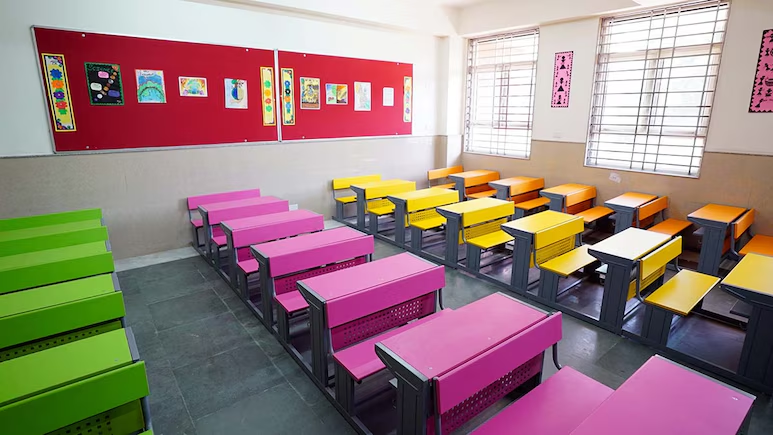
First bell! It is the name of the virtual sessions organised by the Kerala State General Education Department, for Classes 1 to 12 from 8.30 AM to 5.30 PM on weekdays as the lockdown rules restricted the opening of the schools on June 1. At least 45 lakh students in Kerala on Monday began attending virtual classes based on the time table brought out by the Kerala Infrastructure and Technology for Education (KITE).
The virtual classes, which are being organised in an bid to ensure that students do not miss out on lessons due to the COVID-19 induced lockdown, are available through VICTERS Channel which is broadcasting under the supervision or State General Education Department along with its website, app and its social media pages.
The time slots for different classes vary from half-an-hour to two hours, a press release issued by KITE said.
The sessions will be held from 8.30 am to 5.30 pm from Monday to Friday for all classes from 1 to 12, except class 11, on the channel.
The classes were initiated by a message from Chief Minister Pinarayi Vijayan who said the decision on online classes was taken due to the pandemic, reported news agency PTI.
Mr Vijayan, in his address to the students, talked about the importance of social distancing and restrictions that are being inflicted in daily life due to the pandemic.
"The teachers and the parents should ensure that the children attend the online class. We have brought out some restrictions in our daily life due to the pandemic. We need to ensure social distancing. It is not possible to start normal classes in schools as it may cause spread of the virus. However, we need to carry forward the studies of our children," Mr Vijayan said while wishing the students a wonderful academic session.
State education minister C Raveendranath said the virtual classrooms are not an alternative to the actual classrooms but it has been provided as the maximum support to students.
"At least 45 lakh students and their parents are in front of the channel for the classes. This is not an alternative to the classroom but the education department has been providing the maximum support to the students," he said.
On the other hand, Minister for Higher Education K T Jaleel launched the online classes for the college students and took history class.
Director of Public Instruction (DPI) K Jeevan Babu said the new method of teaching and studying is a challenge for the teachers and the students.
According to him, the department was worried about a section of students who lacked facilities for online classes and had identified over two lakh students in that category.
"We have entrusted the class teachers and school headmasters or principals to make sure that students have access to a television or a smart phone or a computer, and Internet for the classes.
If not, they should find an alternative for the students to attend the online classes either in real time or later," Mr Babu said.
The department suggested alternatives including television or Internet facilities of neighbours, friends staying nearby, libraries or Akshaya centres.
The department also informed that all the classes will be in a downloadable format and can be compiled together and shown to those who have missed the class later.
The department said in the firstweek, the classes will be telecast on a trial basis and these will be repeated in the second week.
The modules for different classes will be prepared by agencies under the General Education Department such as the State Council of Educational Research and Training (SCERT), KITE, Samagra Shiksha Kerala (SSK), and the State Institute of Educational Technology.
KITE informed that for the first week at least 1.2 lakh laptops, over 7,000 projectors and nearly 4,545 televisions have been readied for the students.
Various NGOs and local self-government institutions have set up digital classrooms in Dalit colonies and adivasi hamlets in Kerala.
The LSGs have tried to bridge the digital divide by crowd-sourcing android TVs and wi-fi devices and certain panchayats have even provided smart phones to those students who lack one.
(With PTI Inputs)
